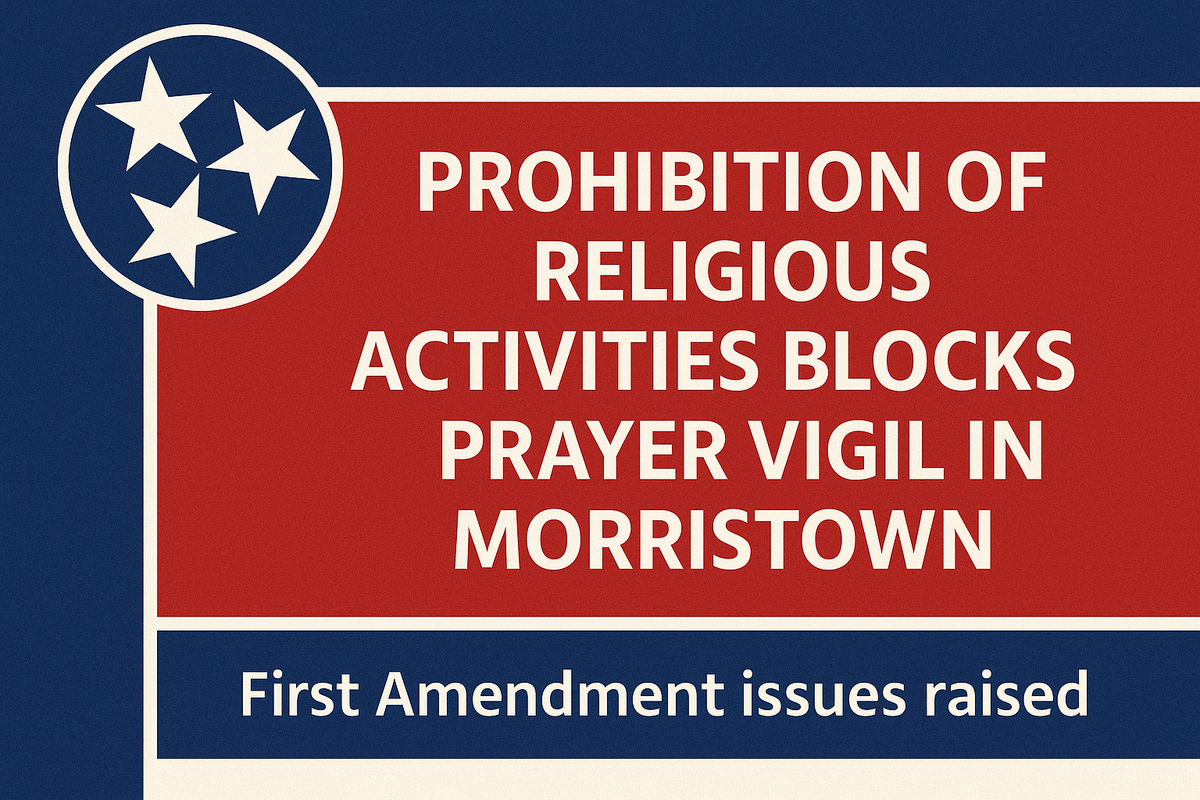Morristown denied a prayer vigil honoring Charlie Kirk, citing an ordinance that bans all religious activity on public property. The ordinance itself—not paperwork—raises serious First Amendment concerns.
The assassination of Charlie Kirk on September 10, 2025, has left communities across America grieving. In Morristown, Tennessee, resident Brad Tumey sought to organize a candlelight prayer vigil on the downtown green to honor Kirk’s life and bring people together in a time of mourning. His request was denied—not because of scheduling conflicts or incomplete paperwork as city officials have emphasized, but because Morristown’s own ordinance bans all “political or religious activities” on the downtown green.
The Ordinance at Issue
Section 9-204 of Morristown’s Code of Ordinances states:
“No one shall engage in solicitation, collection drives and/or distributions, political or religious activities on the premises.”
This provision applies to the downtown green and the farmers’ market, both city-owned public spaces that frequently host concerts, car shows, family gatherings, and corporate events. By its plain text, the ordinance prohibits prayer vigils, Bible readings, or any other form of religious expression in these public spaces, even while allowing comparable secular gatherings.
First Liberty Institute’s Legal Challenge
On September 17, 2025, First Liberty Institute, the nation’s largest legal organization dedicated to defending religious liberty, sent a letter to Morristown Mayor Gary Chesney, City Attorney Lauren Carroll, and Assistant City Manager Andrew Ellard. The letter argued that Morristown’s ordinance violates both the Free Speech and Free Exercise Clauses of the First Amendment, as well as Tennessee’s Religious Freedom Restoration Act.
“Tumey’s desire to organize and engage in a prayer vigil falls squarely under the protection of both clauses,” the letter states, citing Supreme Court precedent that public parks are “quintessential” public forums for speech and assembly. It further notes that the ordinance is a content-based restriction, singling out religion for exclusion while allowing concerts, corporate meetings, and family reunions.
The letter also highlights that the ordinance burdens free exercise in a discriminatory way: secular activities are permitted while religious ones are prohibited. Such disparity, the letter argues, reveals hostility toward religion and cannot be justified as neutral regulation.
City’s Response and Avoidance
In response to public scrutiny, Morristown officials pointed to Tumey’s application timeline, missing insurance documents, and the scheduling of other events. City Administrator Andrew Ellard argued that alternative parks were available for the vigil and insisted that the downtown green is primarily a “commerce space.”
But this defense sidesteps the core issue: no amount of procedural compliance could have changed the outcome because the ordinance itself categorically bans religious gatherings. The problem is not paperwork; it is the ordinance.
Accountability and Oversight
Unlike the mayor and city council, Morristown’s city administrator—currently Andrew Ellard—holds an appointed position with no term limit, serving at the discretion of elected officials. That means key decisions about citizens’ constitutional rights are being made by a bureaucrat who does not face voters and can serve indefinitely. This structure raises further questions about accountability when constitutional rights are at stake.
Broader Implications
The ordinance creates what First Liberty calls a “religion-free zone” in a traditional public forum. The Supreme Court has made clear that governments cannot erase the public forum character of streets and parks by decree. As the letter puts it:
“The City welcomes the public to reserve the downtown green for both public and private events, such as car shows, concerts, corporate meetings, or even family gatherings. Yet, any religious activity is outright banned.”
Such a framework not only conflicts with the First Amendment but also risks setting a dangerous precedent. If prayer can be banned in one public space, speech of any kind can be regulated in others by the same logic.
Conclusion
The denial of a prayer vigil in Morristown is more than a scheduling dispute—it is the enforcement of an unconstitutional ordinance that explicitly targets religious expression. While officials have emphasized technicalities in Tumey’s application, the real issue is a law that cannot withstand constitutional scrutiny.
As the First Liberty Institute’s demand letter makes clear, the City of Morristown now faces a choice: correct course and allow citizens to exercise their rights in the public square, or risk litigation for violating the very freedoms the Constitution was written to protect.
If you support what we do, please consider donating a gift in order to sustain free, independent, and TRULY CONSERVATIVE media that is focused on Middle Tennessee and BEYOND!



Comments ()